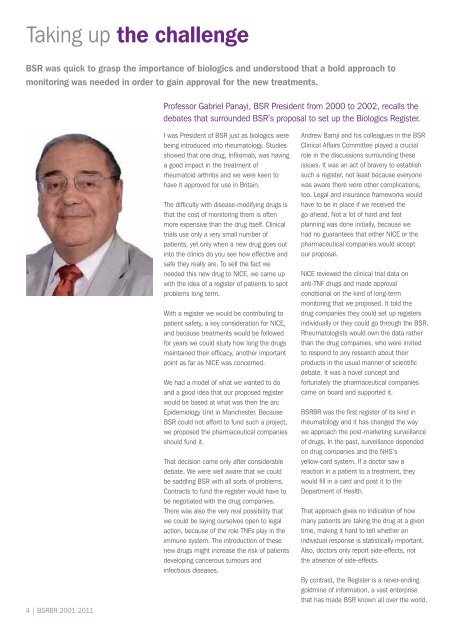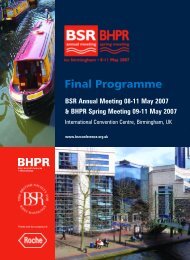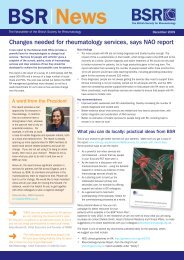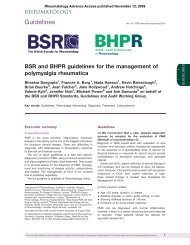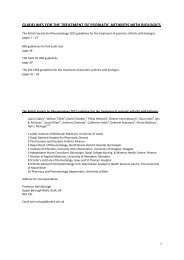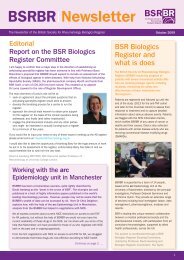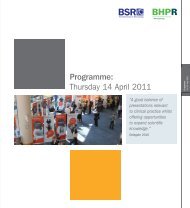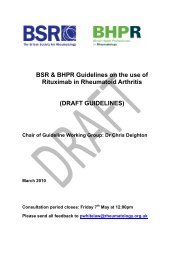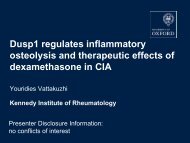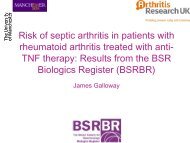BSRBR 10th Anniversary brochure - The British Society for ...
BSRBR 10th Anniversary brochure - The British Society for ...
BSRBR 10th Anniversary brochure - The British Society for ...
Create successful ePaper yourself
Turn your PDF publications into a flip-book with our unique Google optimized e-Paper software.
Taking up the challenge<br />
BSR was quick to grasp the importance of biologics and understood that a bold approach to<br />
monitoring was needed in order to gain approval <strong>for</strong> the new treatments.<br />
Professor Gabriel Panayi, BSR President from 2000 to 2002, recalls the<br />
debates that surrounded BSR’s proposal to set up the Biologics Register.<br />
4 | <strong>BSRBR</strong> 2001-2011<br />
I was President of BSR just as biologics were<br />
being introduced into rheumatology. Studies<br />
showed that one drug, Infliximab, was having<br />
a good impact in the treatment of<br />
rheumatoid arthritis and we were keen to<br />
have it approved <strong>for</strong> use in Britain.<br />
<strong>The</strong> difficulty with disease-modifying drugs is<br />
that the cost of monitoring them is often<br />
more expensive than the drug itself. Clinical<br />
trials use only a very small number of<br />
patients, yet only when a new drug goes out<br />
into the clinics do you see how effective and<br />
safe they really are. To sell the fact we<br />
needed this new drug to NICE, we came up<br />
with the idea of a register of patients to spot<br />
problems long term.<br />
With a register we would be contributing to<br />
patient safety, a key consideration <strong>for</strong> NICE,<br />
and because treatments would be followed<br />
<strong>for</strong> years we could study how long the drugs<br />
maintained their efficacy, another important<br />
point as far as NICE was concerned.<br />
We had a model of what we wanted to do<br />
and a good idea that our proposed register<br />
would be based at what was then the arc<br />
Epidemiology Unit in Manchester. Because<br />
BSR could not af<strong>for</strong>d to fund such a project,<br />
we proposed the pharmaceutical companies<br />
should fund it.<br />
That decision came only after considerable<br />
debate. We were well aware that we could<br />
be saddling BSR with all sorts of problems.<br />
Contracts to fund the register would have to<br />
be negotiated with the drug companies.<br />
<strong>The</strong>re was also the very real possibility that<br />
we could be laying ourselves open to legal<br />
action, because of the role TNFs play in the<br />
immune system. <strong>The</strong> introduction of these<br />
new drugs might increase the risk of patients<br />
developing cancerous tumours and<br />
infectious diseases.<br />
Andrew Bamji and his colleagues in the BSR<br />
Clinical Affairs Committee played a crucial<br />
role in the discussions surrounding these<br />
issues. It was an act of bravery to establish<br />
such a register, not least because everyone<br />
was aware there were other complications,<br />
too. Legal and insurance frameworks would<br />
have to be in place if we received the<br />
go-ahead. Not a lot of hard and fast<br />
planning was done initially, because we<br />
had no guarantees that either NICE or the<br />
pharmaceutical companies would accept<br />
our proposal.<br />
NICE reviewed the clinical trial data on<br />
anti-TNF drugs and made approval<br />
conditional on the kind of long-term<br />
monitoring that we proposed. It told the<br />
drug companies they could set up registers<br />
individually or they could go through the BSR.<br />
Rheumatologists would own the data rather<br />
than the drug companies, who were invited<br />
to respond to any research about their<br />
products in the usual manner of scientific<br />
debate. It was a novel concept and<br />
<strong>for</strong>tunately the pharmaceutical companies<br />
came on board and supported it.<br />
<strong>BSRBR</strong> was the first register of its kind in<br />
rheumatology and it has changed the way<br />
we approach the post-marketing surveillance<br />
of drugs. In the past, surveillance depended<br />
on drug companies and the NHS’s<br />
yellow-card system. If a doctor saw a<br />
reaction in a patient to a treatment, they<br />
would fill in a card and post it to the<br />
Department of Health.<br />
That approach gives no indication of how<br />
many patients are taking the drug at a given<br />
time, making it hard to tell whether an<br />
individual response is statistically important.<br />
Also, doctors only report side-effects, not<br />
the absence of side-effects.<br />
By contrast, the Register is a never-ending<br />
goldmine of in<strong>for</strong>mation, a vast enterprise<br />
that has made BSR known all over the world.


